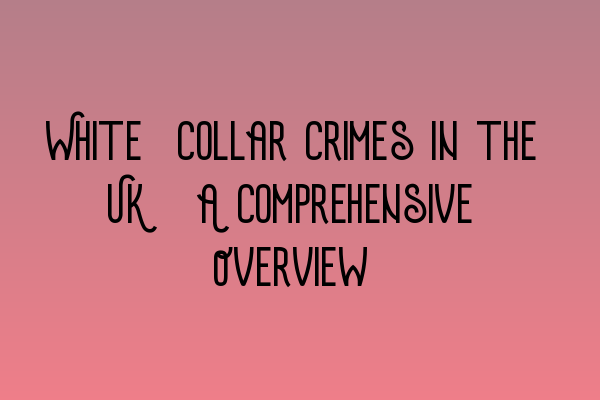White-Collar Crimes in the UK: A Comprehensive Overview
White-collar crimes refer to non-violent criminal activities typically committed by individuals in professional or business settings. These crimes often involve deceit, fraud, or the violation of trust for personal or financial gain. In the United Kingdom, white-collar crimes are taken seriously and can result in severe legal consequences. Understanding the various types of white-collar crimes and their implications is crucial for both legal professionals and the general public.
Types of White-Collar Crimes
1. Fraud: Fraud is a broad term that encompasses various illegal activities, including corporate fraud, identity theft, insurance fraud, and money laundering. Fraud involves deceptive practices aimed at obtaining financial or personal benefits from individuals, organizations, or the government.
2. Embezzlement: Embezzlement refers to the misappropriation of funds or property entrusted to an individual by their employer. This white-collar crime involves the illegal transfer or use of assets for personal gain, often done by employees or executives within an organization.
3. Insider Trading: Insider trading involves trading securities based on material non-public information. This practice is illegal and gives individuals an unfair advantage in the stock market. It undermines market integrity and can lead to significant financial losses for unsuspecting investors.
4. Bribery: Bribery is the act of offering, giving, receiving, or soliciting something of value to influence the actions of an individual in a position of power or authority. It can occur in various contexts, such as business, politics, or public administration, and is an offense punishable by law.
5. Money Laundering: Money laundering is the process of concealing the origins of illegally obtained money by making it appear as if it came from legitimate sources. This criminal activity is prevalent in cases involving drug trafficking, corruption, or tax evasion. The UK has implemented strict regulations to combat money laundering and ensure financial transparency.
Legal Consequences and Investigations
When someone is suspected of committing a white-collar crime, an investigation is initiated by law enforcement agencies or regulatory bodies. These investigations examine financial records, interview witnesses, and gather evidence to build a case against the alleged perpetrator.
Upon conviction, individuals involved in white-collar crimes may face significant penalties, including fines, imprisonment, or both. The severity of the punishment depends on the specific white-collar crime committed, the amount of money involved, and the level of harm caused.
Legal professionals experienced in criminal law and practice are crucial for both prosecuting and defending individuals accused of white-collar crimes. If you are facing criminal charges related to white-collar crimes, it is essential to seek expert legal advice to protect your rights and interests.
Conclusion
White-collar crimes in the UK pose serious legal and ethical concerns. Understanding the different types of white-collar crimes and their consequences is essential for legal professionals and individuals working in business and finance sectors. If you are interested in further exploring the topic of white-collar crimes or preparing for the SQE exams, we recommend checking out these related articles:
- SQE 1 Practice Exam Questions
- SQE 1 Practice Mocks FLK1 FLK2
- SQE 2 Preparation Courses
- SQE 1 Preparation Courses
- SRA SQE Exam Dates
By staying informed and educating others about white-collar crimes, we can work towards building a more transparent and accountable society.
